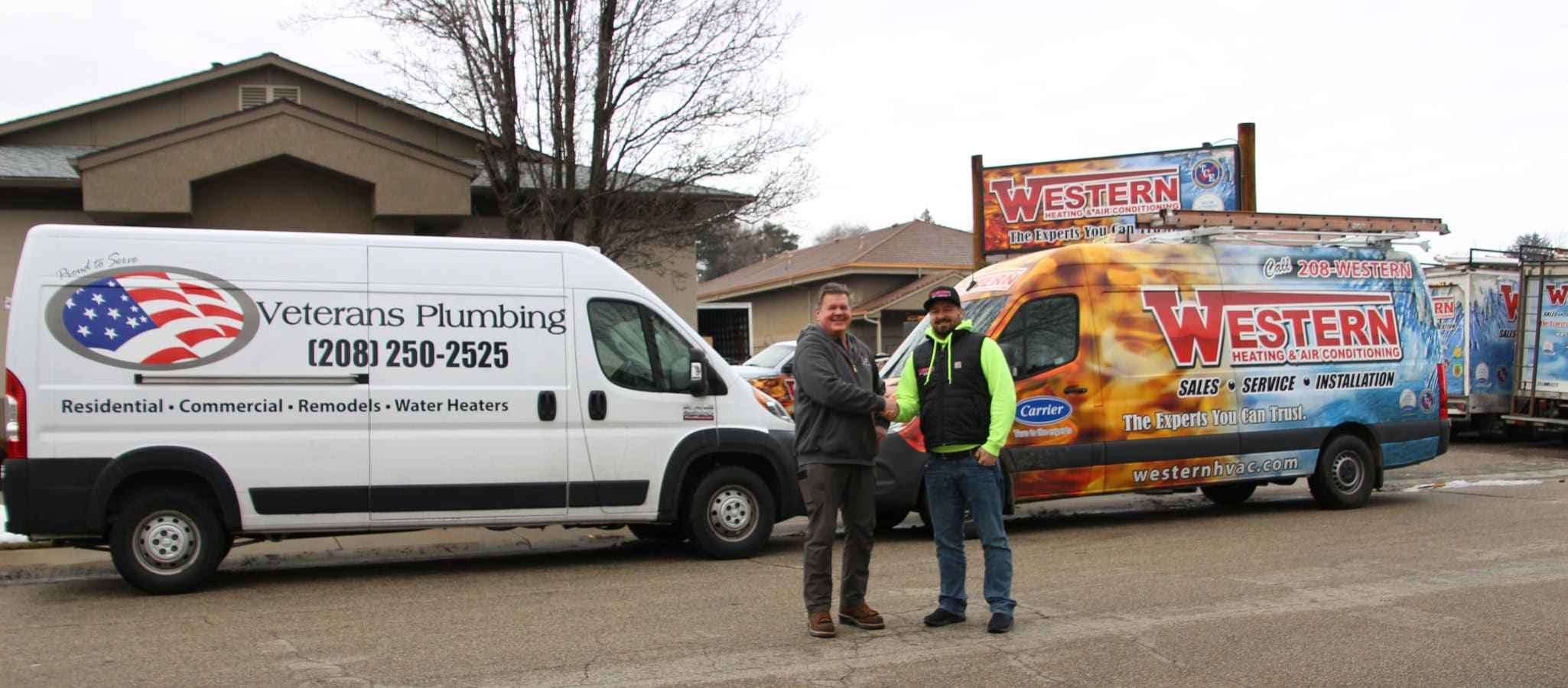Winterization Services

Are you ready for the Treasure Valley chill? As temperatures drop across Boise and the surrounding communities, protecting your home’s plumbing system with winterization services is a necessity.
Frozen pipes are a major risk for Boise homeowners, leading to catastrophic bursts, costly water damage, and emergency repairs. Avoid the crisis this season by partnering with your trusted local experts at Western for comprehensive winter plumbing protection.
Western Heating & Air Conditioning, family-owned and operated, has been helping homeowners with their plumbing, electrical, and HVAC systems since 1967. Veterans Plumbing, a division of Western, is operated by Scott Sparrell, a former member of the U.S. Marine Corps.
You can trust our team to do the job right at a competitive price.
Why Winterize Your Plumbing in Idaho?
When water freezes inside pipes, it expands with immense force, creating pressure that can cause leaks or pipe rupture. This frequently happens in unheated spaces like crawl spaces, garages, and near exterior walls.
The consequences of neglecting your winterization services are severe and expensive:
- Catastrophic Flooding: A single burst pipe can release hundreds of gallons of water per hour into your home, practically destroying your property.
- Massive Repair Bills: Covering emergency plumbing service, structural water damage, and personal property replacement.
- Mold and Mildew Growth: Water damage creates a perfect environment for mold, leading to additional health and remediation costs.
- Loss of Functionality: Long periods without running water, heat, or working appliances.
For Boise homeowners, prevention is always cheaper and less stressful than the aftermath of a burst pipe.
Your Guide to Winter Plumbing Protection
While Western’s and Veterans Plumbing’s licensed plumbers are ready to handle the heavy lifting, here are essential tips you can follow to safeguard your plumbing system before the hardest freeze hits.
1. Exterior Plumbing Prep for Cold Weather
The most exposed parts of your system are the first to freeze.
- Remove Hoses: Disconnect, drain, and store all garden hoses indoors. Leaving a hose connected prevents water from draining properly and can freeze the faucet.
- Shut Off Outdoor Faucets: For our older homes, locate the interior shut-off valve (usually in the basement or garage) and turn off the water supply to all exterior spigots. Then, open the outdoor faucet to drain any residual water.
- Insulate Spigots: For an extra layer of protection, install insulated covers or “bibs” on all outdoor faucets.
- Drain Sprinkler Systems: Ensure your irrigation and sprinkler systems are completely blown out or drained.
2. Insulate Pipes to Prevent Freezing
Any pipe running through an unheated space is a target.
- Identify Problem Areas: Check pipes in crawl spaces, basements, attics, garages, and cabinets along exterior walls.
- Apply Protection: Use foam pipe insulation sleeves to cover exposed pipes. For pipes prone to freezing, consider professionally installed heat tape or heat cables.
- Seal Entry Points: Caulk or seal any gaps, cracks, or openings where pipes enter your home to prevent cold air from entering.
- Protect Your Crawl Space: Foundation vents should be insulated or closed in the winter months to stop cold air from entering the crawl space.
3. Winter Plumbing Tips for Daily Use
Even when you’re home, these small steps reduce your risk:
- Circulate Warm Air: Open kitchen and bathroom cabinet doors beneath sinks to allow warm interior air to circulate around the pipes.
- The Power of the Drip: When temperatures dip below freezing, let a few faucets—especially those on exterior walls—drip slowly. This constant movement relieves pressure and prevents freezing.
- Maintain Temperature: Keep your garage doors closed and maintain a consistent indoor temperature both day and night.
4. How to Prepare Plumbing for Long Vacations
If you plan to leave your Boise home for an extended period, follow these crucial steps for total peace of mind:
- Set the Thermostat: Do not turn your heat off. Keep your thermostat set to a minimum of 55°F to prevent ambient air around pipes from dropping dangerously low.
- Shut Off Water Supply: Turn off the main water valve (or well pump) leading into your house.
- Drain the System: Open all faucets (hot and cold) to drain water from the pipes. Flush all toilets and empty the hot water tank.
- Safeguard Drains: Pour non-toxic plumbing antifreeze into toilet bowls, tanks, and drains with traps (like sinks and tubs) to prevent residual water from freezing and cracking the porcelain or pipes.
Expert Winterization Services by Western & Veterans Plumbing
While DIY steps help, the most reliable protection comes from a comprehensive plumbing inspection and winterization service by a trusted professional.
At Western, our licensed and fully trained plumbers—under the banner of Veterans Plumbing—specialize in whole-home maintenance and risk prevention.
Contact Western Today For:
- Full Plumbing System Inspections: Identifying and insulating all high-risk areas unique to your Boise home.
- Pipe Insulation and Heat Trace Installation: Professional-grade materials and installation for maximum cold-weather defense.
- Water Heater Winterizing: Ensuring your home's water heater is running efficiently and protected from the elements.
- Frozen Pipe Diagnosis and Repair: Rapid response and expert pipe repair solutions if an emergency occurs.
Schedule Your Winterization Service Today
Let Veterans Plumbing’s experienced Boise plumbers ensure your plumbing system is robust enough to withstand the coldest Idaho winter.
Don’t wait for the ice to form! Contact Western Heating & Air Conditioning today to schedule your professional winterization service. Call us now at 208-319-1736 or request service online.
